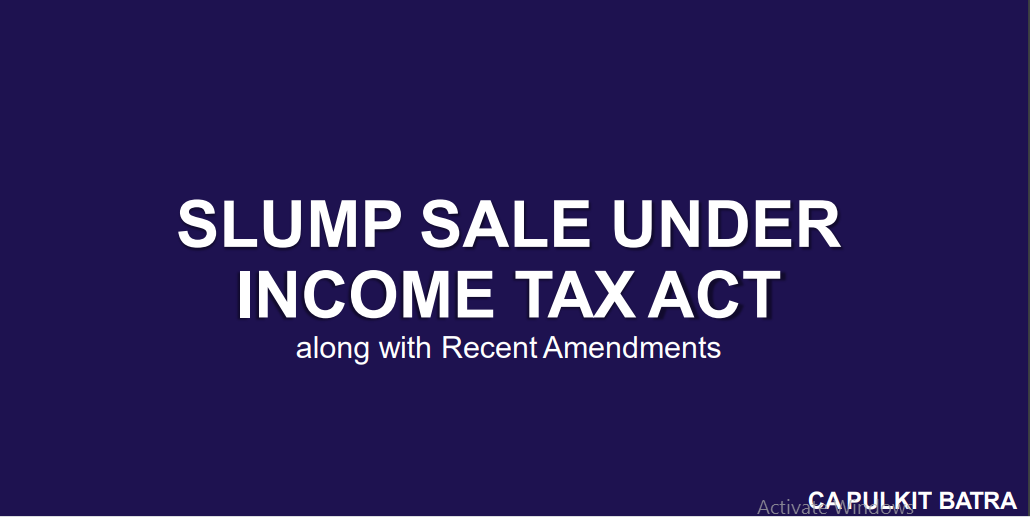Slump Sale Under Income Tax Act Along with Recent Amendments
Table of Contents
Introduction of Slump Sale
• The clause 42C of section 2 of the Income Tax Act was introduced via Finance Act 1999, Prior to the insertion Courts have held that slump sale is a sale of a business on a going concern basis where the lumpsum price cannot be attributed to individual assets or liabilities.
• Was Not Charged to TAX (didn’t fall under PGBP or Capita Gains) – That if the computation cannot be made in absence of cost of acquisition, then the charging section itself would not be applicable. (PNB Finance v. CIT, [2008])
• To plug in these tax loopholes, a slump sale mechanism was introduced & computation was given under section 50B
Related Topic:
Issuance of notice u/s 131 (1A) of the Income Tax Act 1961
Why Slump Sale:
• To focus on specific business processes
• To hive off a business segment (Tata Motors)
• To purchase an existing business along with its customers & market (Ruchi Soya & Patanjali)
• To reduce compliance costs (multiple entities = more compliance)
• For better Tax administration.
Related Topic:
TCS under section 206C(1H) of income tax Act
Slump Sale under Indirect Tax
- Is it a “supply”? Under section 7
- Goods or Services It is a supply of service
- Valuation of Supply under sec 15 & Rule 28 to 31
- Rate of Tax-Exempt under notification 12/2017 – CT(R)
Related Topic:
GST on slump sale in the light of amendment in Supply
Recent amendments in Slump Sale Provisions
1. Change in the definition (amendment to clause 42C of sec 2)
• Earlier the clause read “slump sale” means the transfer of one or more “undertaking as a result of the sale“
• New Clause reads “slump sale” means the transfer of one or more [undertaking, by any means,]”
• Effect – Transactions of Slump Exchange also covered in the definition of Slump Sale. (Hon’ble Bombay HC in Bharat Bijlee (supra) & Areva T & D Ltd. v. CIT, [2020] reversed)
Recent amendments in Slump Sale Provisions
2. Valuation for Goodwill Changed (amendment to sec 50B)
• If the goodwill is other than purchased from the previous owner – the value of such goodwill will be deemed to be zero.
• Department may contend that the intangible assets of similar nature viz. customer lists, brands, etc. are nothing but good will and might disallow their value.
• Effect – Net worth will be reduced which means more capital gains.
Related Topic:
No Clear guidelines for seizure of Jewellery found during search and its assessment thereon under Income Tax Act
Recent amendments in Slump Sale Provisions
3. Change in “Full value of Consideration” (amendment in sec 50B)
• Full value of consideration is higher than FMV 1 & FMV 2–
FMV 1 = A + B + C + D – L
Where,
A: Book value of all asset (other than valuable assets) appearing in the books of transferor after adjusting Income Tax paid/refund & Deferred Tax assets
B: Price of Jewellery and Artwork
C: FMV of Shares
D: Value of Immovable Property
L: Book value of liabilities after adjusting shareholder fund, certain reserves, taxes, and contingent liabilities (only real liabilities considered)
Conclusion
• The government is surely making meaningful and valid efforts in plugging in the loopholes exploited in the past.
• These amendments may result in an increase in revision in deals, litigations & increased collections in taxes.
• One of the important observations is that the calculation of fair market value requires assessing the value of assets which is against the spirit of slump transaction.
• It will be interesting to see what the future holds for such deal transactions.
Read & Download the full copy in pdf:
 CA Pulkit Batra
CA Pulkit Batra
Chartered Accountant and certified forensic accountant with exposure in the fields Tax, Transaction Advisory, Due Diligence and Management Reporting. Always open for opportunities to enhance my skill and add value to stakeholders. Passionate about Taxation, Processes, Technology, Stock Markets and Stand up Comedy.








